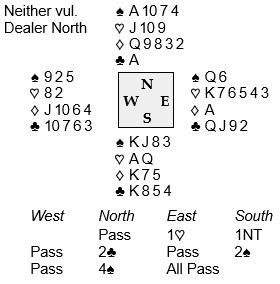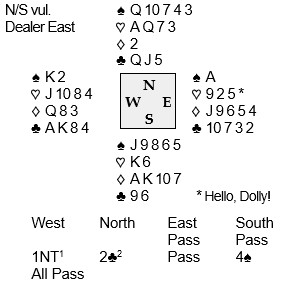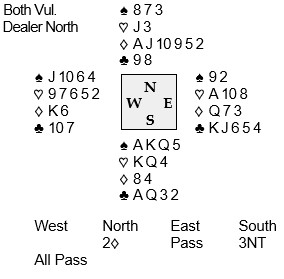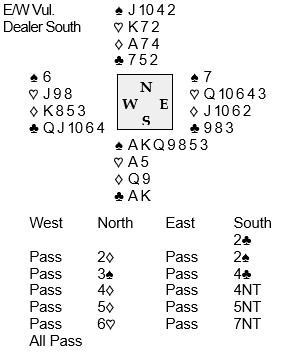The four deals you have played are from Simon Cochemé's latest book Bridge with a Twist.
 |
Simon is an enthusiastic but moderate (his choice of word) player and, after working for IBM for 37 years, is devoting some of his retirement years to various aspects of the game. He was on the London Committee and organised the Lederer Memorial Invitation Tournament on their behalf for five years. He was vice-chairman of the EBU Selection Committee from 2008 to 2014. |
Disclaimer: The order of the boards below is slightly different to the order you have played.
Board 1

South overcalls 1NT with his 16 count. (I think this expresses the hand better than a take-out double). North uses Stayman (‘system on’ after a 1NT overcall), finds there is a spade fit, and bids game.
West leads the ♥8. East, of course, should not play the ♥K. If West’s ♥8 is a singleton, declarer always has three hearts tricks, whatever East plays. If West’s ♥8 is a doubleton, then declarer will only make two heart tricks, so long as East doesn’t play the ♥K.
South might not think it matters which card he plays from dummy, since he knows he is going to win with the ace or queen, but he should tempt East by calling for the jack. It really shouldn’t work, should it? But it might!
A simple deal, with three extra bits of information:
Board 2

1 Weak no-trump, 12-14
2 Landy, showing both majors
When partner shows both majors over West’s weak no-trump, South, with a near opening bid, decides to bid game.
Prospects look bleak when West cashes his top clubs and switches to the ♥J. With the ace-king of trumps still out, there is little that declarer can do.
But there is one chance. Declarer wins the third trick in hand and leads a low spade towards dummy, through the hand that must have at least two spades. West may make an instinctive play and go in with his king. Whoops! The two trump losers have become one and the contract rolls home.
West, of course, should ask himself why declarer is playing the trump suit like that. If declarer held the ace, surely he would have taken a finesse, or at least have played the ace to try and drop a singleton king.
Board 3

South was in 3NT and won the opening heart lead in hand: ♥7-3-10-K. She ran the ♦8 to the queen. East now cashed the ♥A and led the ♥8 to South’s queen. Declarer played another diamond, the king popped up, and she ended with eleven tricks, without needing to risk the club finesse.
Can you see where the defence went wrong? West must play the ♦K on the first round of the suit. Declarer will have to duck in dummy, hoping that West has the ♦Q as well. If declarer plays the ♦A over the king, she is abandoning all hope of making more than one diamond trick.
At the other table in this Women’s International event, North ended up as declarer in 3NT after a complicated sequence. When declarer called for a diamond from dummy, Sally Brock, West, a multiple World Champion, went in with the king – a much harder play to find when the hand with the long diamonds isn’t visible.
Inserting the king in such a situation is known as a ‘nutmeg’, the term used in soccer when you kick the ball between an opponent’s legs. Second hand normally plays low, so they wrote a song in recognition of Sally’s fine play: Second Hand Rose.
Board 4

A Chinese finesse is where you lead an unsupported honour and attempt a finesse which, if covered, would fail.
This deal comes from a Round Robin match in the World Championships in Genovia, played between Ruritania and Illyria:
West led the ♣Q and the Ruritanian declarer studied the dummy. Surely they had agreed to show the number of kings in response to five no-trumps, not specific kings. Alexei should have bid 6♦, not 6♥. Now, what could be done?
Declarer won the lead with the ♣A and immediately played the ♦Q from hand. West followed low, the queen held the trick, and declarer claimed his thirteen tricks. The Illyrians then had a vigorous exchange of views. East waved the jack-10 of diamonds under West’s nose and West replied, saying something like (my colloquial Illyrian is a little rusty) “But what if declarer has queen-jack-9 of diamonds and a singleton club? If I cover the queen he can finesse the ♥9 on the way back.”
Knowing when to play an honour and when to duck is a tricky business!